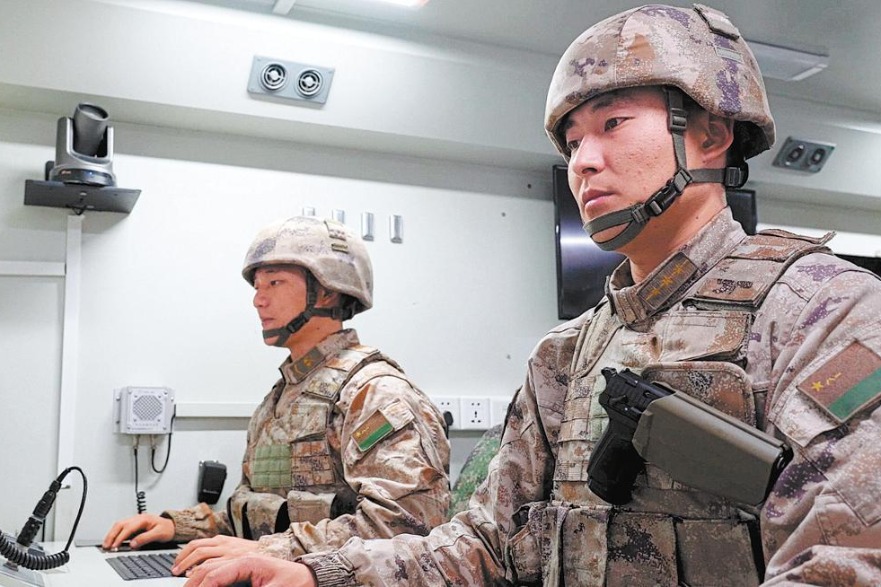PSYCHOLOGICAL SERVICES IN DEMAND
Social workers, volunteers and therapists invited to offer advice

On May 12, Beijing was abuzz with rumors that the city would be locked down next day, prompting many residents to stock up on groceries.
The rumors were quickly denied by the municipal government at a news conference that afternoon, with the authorities saying that daily supplies would not be affected and there was no need for panic buying.
These rumors have been dispelled, but as several cities grapple with a new wave of COVID-19 infections caused by the highly transmissible Omicron variant, concern for people's mental health during the pandemic has again become an important issue that different sides of society are working hard to address.
On April 28, psychological counselor Wang Xiaoting offered an open counseling session on social media, with residents in Shanghai, which has been under closed-loop management for more than a month, phoning in for help.
The first caller asked how he could deal with his family members' fear of the outbreak. After being diagnosed as an asymptomatic case and receiving treatment at a makeshift hospital, the man returned home, only to face misunderstanding and suspicion from his family.
"At the makeshift hospital, people were not scared. We ate well and slept well, but now I am home, my parents are suspicious and on their guard. No matter whether I am eating or talking, they want to keep their distance. I feel I am being marginalized," the caller said.
He added that his mother asked him to eat alone and to put his bowls on the ground after he finished his meals. After he used the toilet, she asked him to disinfect the bathroom.
"I tried to convince them, telling them that Omicron is not as harmful as they think, but they didn't believe me," he added.
The second caller also shared her fear of being discriminated against after she became infected. She was placed in quarantine for nearly two weeks after testing positive, and still thinks she may have caught the disease from her husband.
The woman, who works at a pharmacy, said she could not bear the thought of her colleagues treating her differently if they found she had been infected.
"I work in the public health sector, so I dare not let my friends or colleagues know I was infected. I am afraid that if I tell them, they will view me differently, and this will alienate me," she said.
She added that she took precautions against COVID-19, but her husband failed to take protective measures after their neighbors were diagnosed with the disease.
"I am not afraid of COVID, because I know it is curable. But I feel that I contracted it because of my husband's negligence. He's the one who gave me the infection," she said.
Wang, who has practiced psychological counseling for 19 years, said the anxiety voiced during the pandemic is reasonable, as such emotional instability stems largely from the nature of the contagious disease. As everyone wants to steer clear of the virus, this causes mistrust and tension between people.
"We fear unknown and uncontrollable things, just like the very beginning of the COVID-19 pandemic. We didn't know what the virus was, how we could protect ourselves, or if we would die," she said.
Free services
In early March, Shanghai reported a rising number of COVID-19 infections, and the entire city was placed under closed-loop management last month to curb the spread of the virus. Wang, who lives in Shanghai, learned about people's psychological needs, and offered free online counseling to 100 residents every day during this period.
She said traumatic stress follows a certain pattern. It starts with a shock phase, prompting people to ask, "Why has this happened to me?", prompting a strong sense of insecurity. The anger phase follows, during which patients want to find who or what caused the disease. When the anger passes, depression sets in, making people feel vulnerable and helpless, or to start blaming themselves.
"At the very early stage, people worry about the basics, including how to obtain enough food, or if they will lose their jobs. They feel very confused," Wang said.
"During the pandemic, most of the people who come to counseling are experiencing the first two phases," she added.
Li Zhen, better known as Jian Lili, a young member of the Chinese Mental Health Association's Professional Committee of Psychological Counselors, said people affected by mental problems fall into three categories.
The first comprises those experiencing stress triggered by real-life problems such as isolation, a lack of food, or having sick family members at home. Then there are people whose old traumas resurface, while the third category comprises those diagnosed with mental illness, Li said.
In 2014, Li founded the online platform Jiandan Xinli (MyTherapist), which connects psychotherapists with clients.
The startup now has more than 1,200 registered Chinese-speaking therapists from 117 cities worldwide. As the COVID-19 outbreak escalated in China, the platform launched a free consultation hotline from 6 pm to midnight. A dozen therapists are on duty every day, but demand for their services still exceeds supply.
Li said, "Most of the problems people seek help for concern anxiety over their careers, dissatisfaction with community management during quarantine, uncertainty about the future, distress by reading negative news every day and unhappiness in family relationships."
Mental health has become a global concern as the pandemic develops. In March, a scientific briefing released by the World Health Organization showed that in the first year of the pandemic, the global prevalence of anxiety and depression rose by 25 percent, with common stress factors including social isolation, loneliness, fear of infection, suffering and death for oneself and among loved ones.
Young people and women were the worst affected by these factors.
Another study, published in The Lancet medical journal in October, showed that the pandemic led to a sharp rise in depressive and anxiety disorders globally in 2020. That year, an additional 53.2 million cases of anxiety and 76.2 million cases of major depressive disorders were reported.
Nationwide hotline
Concerns about potential rises in mental health cases prompted many countries to include mental health and psychosocial support in their COVID-19 response plans.
In February 2020, during the initial outbreak in Wuhan, capital of Hubei province, the Chinese government launched a 24-hour nationwide psychotherapy hotline. The following month, the National Health Commission issued a work plan for psychological counseling during the pandemic.
Chen Jun, director of the clinical research center office at Shanghai Mental Health Center, told China News Service that by 2020, the Shanghai health authorities had developed a psychological screening system for healthcare workers and COVID-19 patients, enabling checks to be carried out and intervention where necessary in key populations with mental problems. The system has since been upgraded and is playing an important role during the current outbreak.
The center continued treatment for psychiatric patients during the lockdown in Shanghai, while sending therapists to makeshift hospitals and other quarantine areas to provide psychological assistance for COVID-19 patients and frontline medical workers.
Late last month, Beijing began to report clusters of COVID-19 cases.
Pang Xinghuo, deputy head of the Beijing Center for Disease Control and Prevention, speaking at a news conference, said residents can access psychological services, including 17 hotlines and a WeChat program, to assess their mental health, practice relaxation, and customize psychological services.
Communities have also invited social workers, volunteers and professional therapists to join messaging groups to offer online advice and mediate in conflicts.
In addition to official efforts, social network providers, including Ximalaya, China's biggest podcasting platform, launched a series livestreaming programs last month, inviting therapists, nutritionists and doctors to share their experience and help viewers relax through interactive conversations.
Wang, the therapist, said the importance of mobilizing social resources has been fully demonstrated at this special time.
People quarantined in Shanghai help each other by trading food and daily necessities when supplies run short. Neighbors also quickly provided medication and ventilators when the father of one of Wang's colleagues had a sudden asthma attack.
Wang said, "In Shanghai, we have seen a strong return of close connections among neighbors, providing an extremely strong social support system that has brought great relief, social stability and a sense of security."
Wang and Li said the demand for psychological services would continue to rise after the situation in Shanghai returns to normal.
Li said that when psychological difficulties arise, people first want to solve their real-life problems.
"Mental disorders often appear after life returns to normal. Shanghai residents at this time are thinking more about buying food, their work and dealing with family relationships. Once life returns to normal, it will take quite a long time to process their emotions, hence the term post-traumatic stress disorder," she said.
"The psychological impact will linger for a long time. Whether at this stage or after restrictions are lifted, psychological support will remain very important."
Liu Xi contributed to this story.

Today's Top News
- PLA fully capable of crushing secessionist attempts
- China holds central rural work conference
- President Xi to deliver New Year's message to ring in 2026
- Xi's diplomacy in 2025: Shedding light on a world at crossroads
- FTP has given Sanya a complete makeover
- China to apply lower import tariff rates to unleash market potential






























